|
| NEWS |
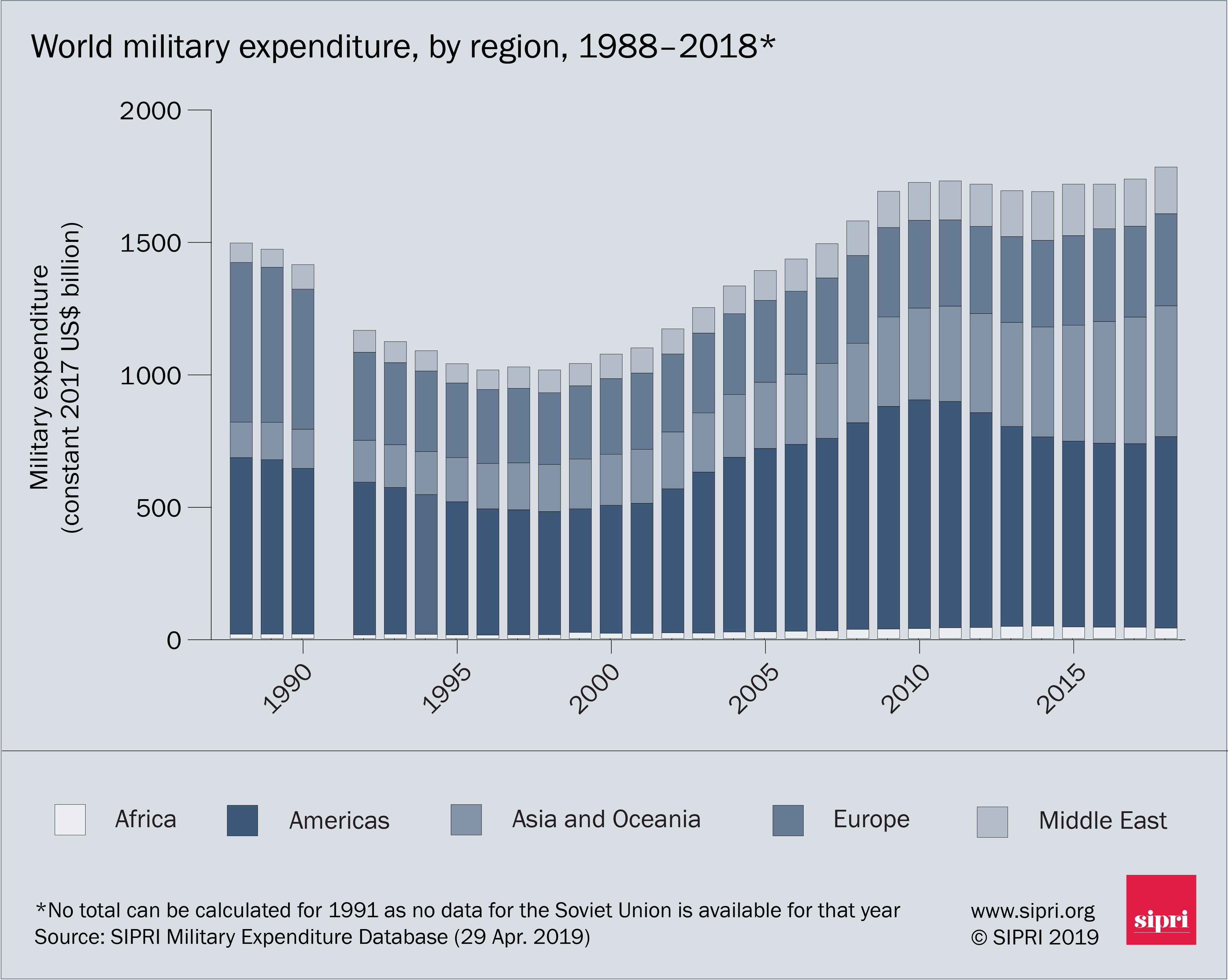 |
| World military expenditure grows to $1.8 trillion in 2018 |
| Total world military expenditure rose to $1822 billion in 2018, representing an increase of 2.6 per cent from 2017, according to new data released by SIPRI this month. The five biggest spenders in 2018 were the United States, China, Saudi Arabia, India and France, which together accounted for 60 per cent of global military spending. Military spending by the USA increased for the first time since 2010, while spending by China grew for the 24th consecutive year. |
|
|
Read the press release | Read the Fact Sheet
|
|
|
 |
| Addressing a key challenge in central Mali: The need for local knowledge |
| This month SIPRI launched a Reflection Film on the conflict in central Mali. The film calls for a more nuanced understanding of local dynamics in order to quell violence and promote peacebuilding. The film is accompanied by a series of SIPRI Spotlight Interviews that present the views of the European Union; the Peacebuilding Fund within the United Nations Multidimensional Integrated Stabilization Mission in Mali (MINUSMA); the World Food Programme; and Point Sud (a Malian research organization and SIPRI’s partner in the country). |
|
|
Read more | Watch the film series
|
|
|
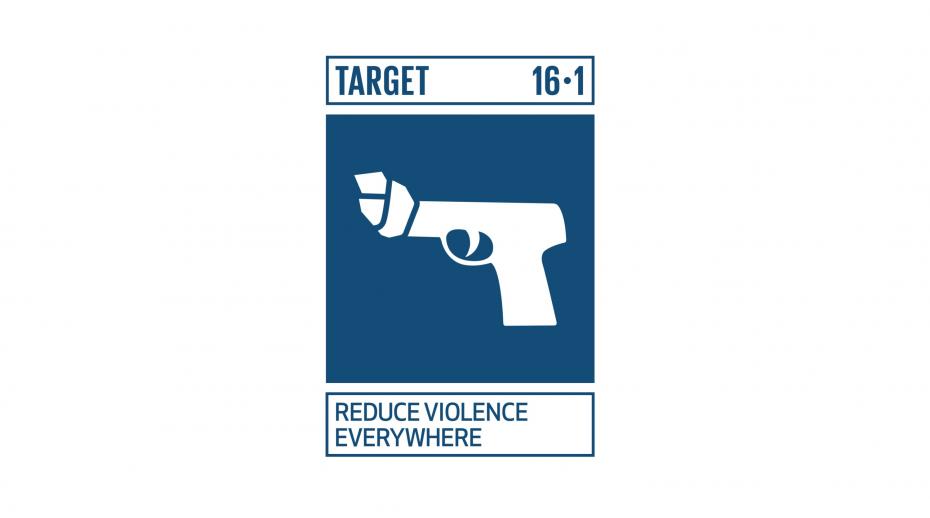 |
| New initiative measuring violent deaths worldwide |
| SIPRI has established a new initiative to determine the annual number of violent deaths worldwide. SIPRI’s Global Registry of Violent Deaths (GReVD) will count deaths caused by all forms of violence and present these statistics in an open-source database. The database will allow researchers, policymakers and the general public to track trends in violence at the global, regional, national, provincial, city and municipal level. This will enable monitoring of progress on the world’s commitment to ‘significantly reduce all forms of violence and related death rates everywhere’ by 2030 as set out in the Sustainable Development Goals (SDGs)—specifically Goal 16. |
|
|
Read more
|
|
|
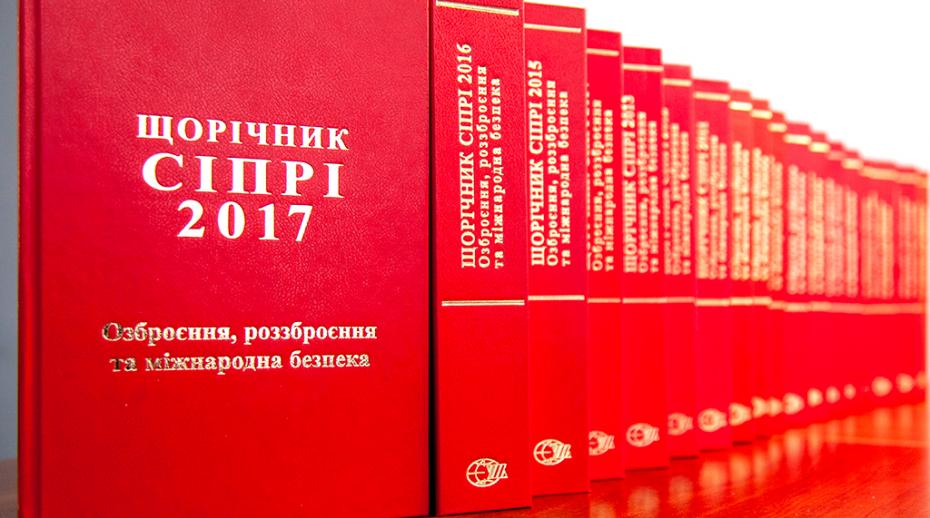 |
| SIPRI Yearbook in Ukrainian launched in Kyiv |
| SIPRI in partnership with the Razumkov Centre launched the Ukrainian language translation of SIPRI Yearbook 2017 in Kyiv, Ukraine. Translations of the SIPRI Yearbook are also available in Arabic, Chinese and Russian. |
|
Read more | Explore translations of the SIPRI Yearbook
|
|
|
|
| COMMENTARY |
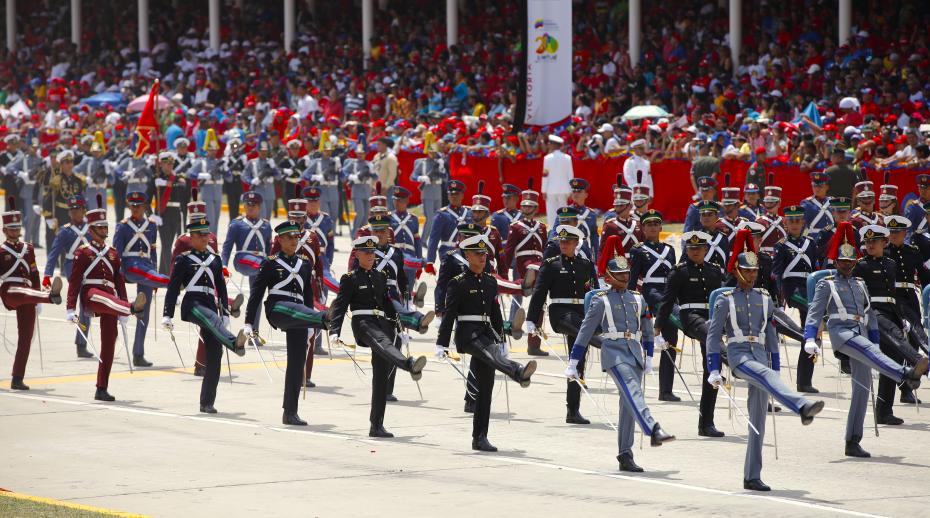 |
| The crucial role of the military in the Venezuelan crisis |
| As the situation in Venezuela unfolds, Dr Nan Tian and Dr Diego Lopes da Silva examine the power that the military holds and the crucial role it plays in shaping the country’s future. The authors argue that although the support of foreign states is an important factor in the current political standoff between Nicolás Maduro and Juan Guaidó, it is the Venezuelan military that will determine whether there is any shift in power. |
|
Read the Topical Backgrounder
|
|
|
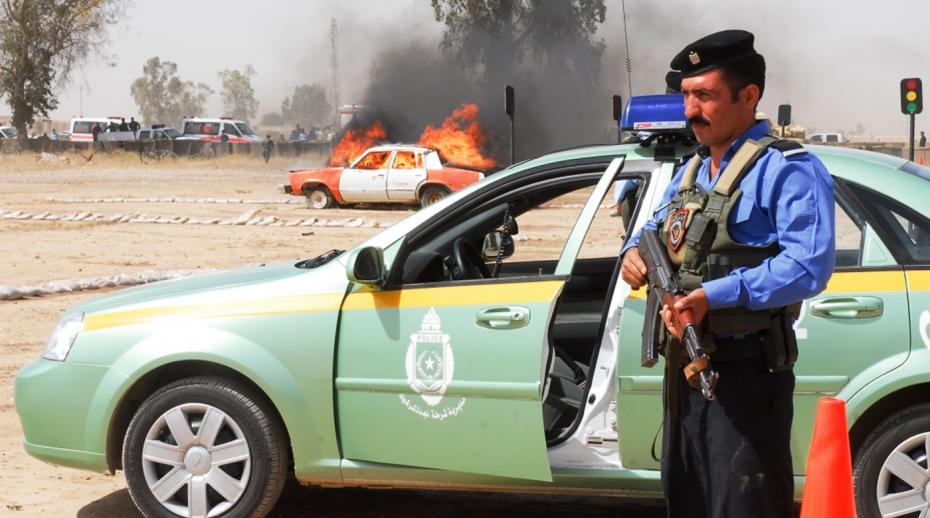 |
| Governing the ‘ungoverned’: Suppressing the Islamic State’s insurgency in Iraq |
| Earlier this month, the Iraqi Counter Terrorism Service targeted the Islamic State in the Hamrin mountain range in Iraq. Dr Dylan O’Driscoll examines the importance of the Iraqi state’s involvement in governance and sustainable security in such isolated spaces. |
|
Read the WritePeace blog
|
|
|
|
| UPCOMING EVENTS |
| |
| 6 May 2019 |
| SIPRI to co-host event on global arms transfers and military spending in Washington, DC |
|
On 6 May, SIPRI will hold an event in partnership with the Stimson Center in Washington, DC. The event will present and analyze the latest trends in global arms transfers and military expenditure. Dr Aude Fleurant, Director of the SIPRI Arms and Military Expenditure Programme; will be a discussant together with Rachel Stohl, Managing Director, Stimson Center.
|
|
Read more
|
|
| |
| 14–16 May 2019 |
| 2019 Stockholm Forum on Peace and Development |
|
The 2019 Stockholm Forum on Peace and Development co-hosted with the Swedish Ministry for Foreign Affairs will be held with the theme ‘From crisis response to peacebuilding: Achieving synergies’. Register now for the public Open Day (14 May) which will feature several high-level panels, current initiatives and knowledge events.
|
|
Read more | Register for the Open Day
|
|
| |
| 27 May 2019 |
| 2019 SIPRI Lecture |
|
The SIPRI Lecture is an annual event in Stockholm on topics related to international peace and security. This year, the SIPRI Lecture will honour HE Michelle Bachelet, the United Nations High Commissioner for Human Rights and former President of Chile. HE Michelle Bachelet has dedicated her professional career to peace, the promotion of human rights and gender equality. The lecture will be followed by a distinguished panel discussion and will also feature piano performances by Professor Staffan Scheja.
|
|
Read more
|
|
|
| RECENT EVENTS |
| |
| 9 April 2019 |
| After the INF Treaty...? |
| The 1987 Treaty on the Elimination of Intermediate-Range and Shorter-Range Missiles (INF Treaty) was once considered a landmark arms control agreement. Now it is on the verge of collapse. This event aimed to address several lingering questions: Will the INF Treaty’s impending expiration be a similar landmark? Or had the INF Treaty outgrown its mission? And in the wake of its demise, what are the ways forward for arms control and international security? |
|
Read more | Watch the livestream
|
|
| |
| 12 April 2019 |
| SIPRI co-hosts a seminar on United Nations peace operations and organized crime |
| SIPRI in cooperation with the Swedish Police Authority organized a seminar discussion on ‘Policing organized crime in the context of United Nations peace operations’. The discussion focused on measures that the UN can take to break the cycle of conflict, counter organized crime and strengthen state institutions. Dr Marina Caparini, Senior Researcher and Director of the SIPRI Governance and Society Programme presented findings from her new SIPRI Discussion Paper ‘UN Police and the challenges of organized crime’. |
|
Read more | Read the Discussion Paper
|
|
|
| JOB VACANCIES |
| |
| Internships |
|
SIPRI has a continuous open call for internships in its research and support departments.
|
|
Read more
|
|
|
| PUBLICATIONS |
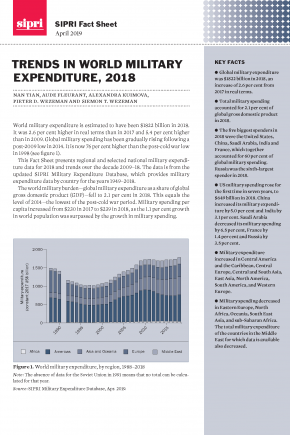 |
| Trends in world military expenditure, 2018 |
| World military expenditure is estimated to have been $1822 billion in 2018. It was 2.6 per cent higher in real terms than in 2017 and 5.4 per cent higher than in 2009. Global military spending has been gradually rising following a post-2009 low in 2014. It is now 76 per cent higher than the post-cold war low in 1998. This Fact Sheet presents regional and selected national military expenditure data for 2018 and trends over the decade 2009–18. The data is from the updated SIPRI Military Expenditure Database, which provides military expenditure data by country for the years 1949–2018. |
|
Read the Fact Sheet
|
|
|
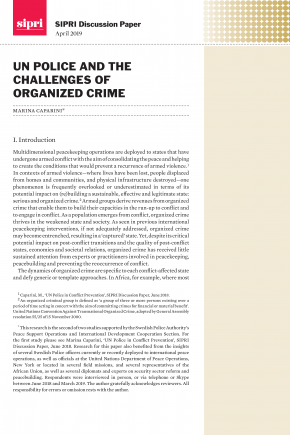 |
| UN Police and the challenges of organized crime |
| This Discussion Paper considers the challenges in dealing with the security and governance risks posed by organized crime in conflict-affected states, with a focus on the role of law enforcement and the United Nations police component. The paper suggests several ways in which UN peacekeeping could more effectively address the threats posed by organized crime in order to achieve and sustain peace. |
|
Read the Discussion Paper
|
|
|
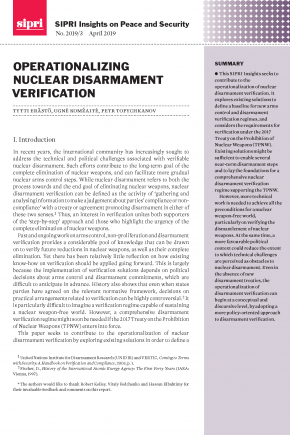 |
| Operationalizing nuclear disarmament verification |
| This SIPRI Insights seeks to contribute to the operationalization of nuclear disarmament verification. It explores existing solutions to define a baseline for new arms control and disarmament verification regimes, and considers the requirements for verification under the 2017 Treaty on the Prohibition of Nuclear Weapons (TPNW). |
|
Read the Insights Paper
|
|
|
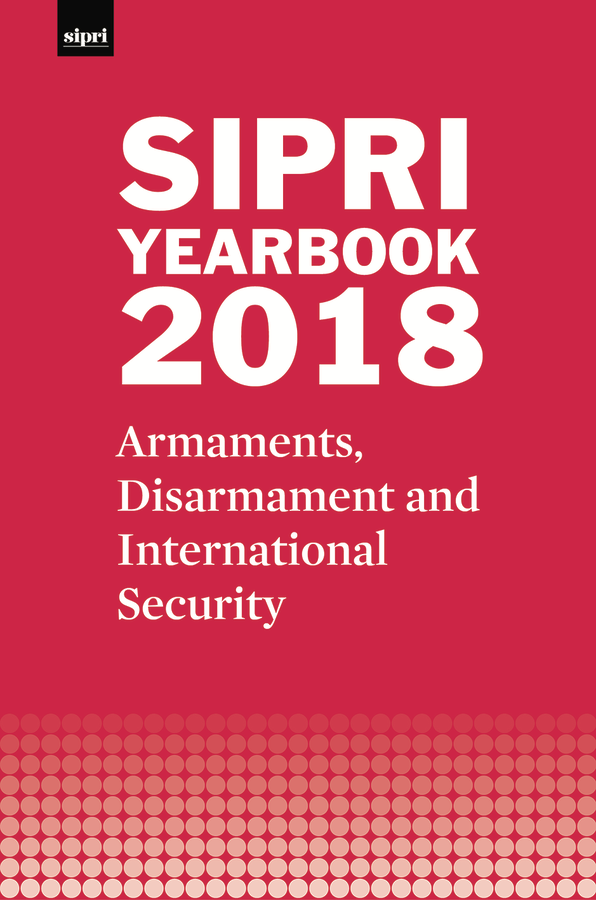 |
| SIPRI Yearbook 2018 |
The 49th edition of the SIPRI Yearbook is a compendium of data and analysis in the areas of security and conflicts; military spending and armaments; and non-proliferation, arms control and disarmament. It also features sections on:
- debt, oil price and military expenditure;
- international non-proliferation sanctions against North Korea; and
- allegations of chemical weapons in Iraq and Syria.
|
|
Browse the contents page | Read the summary [PDF]
|
|
|
| |